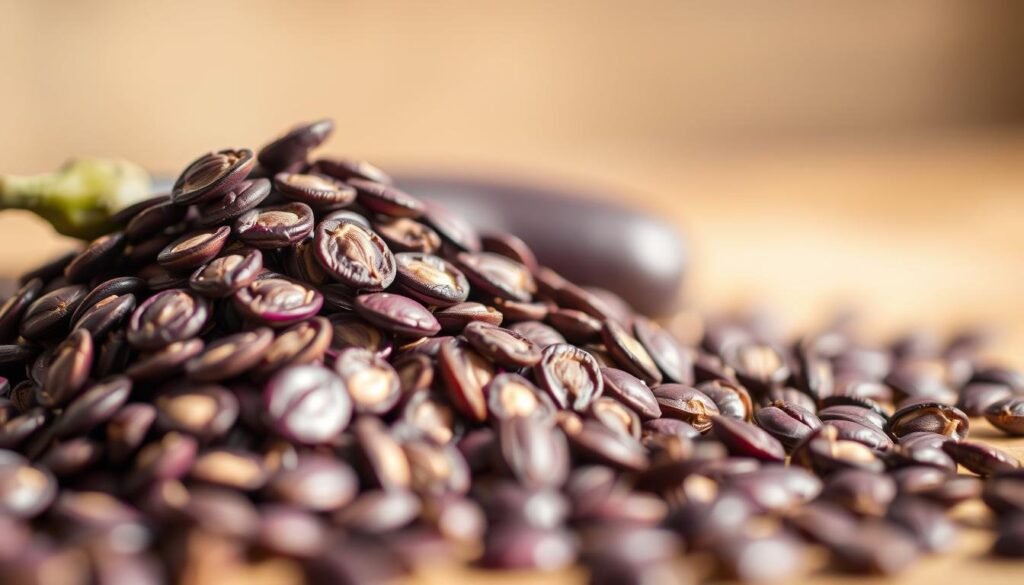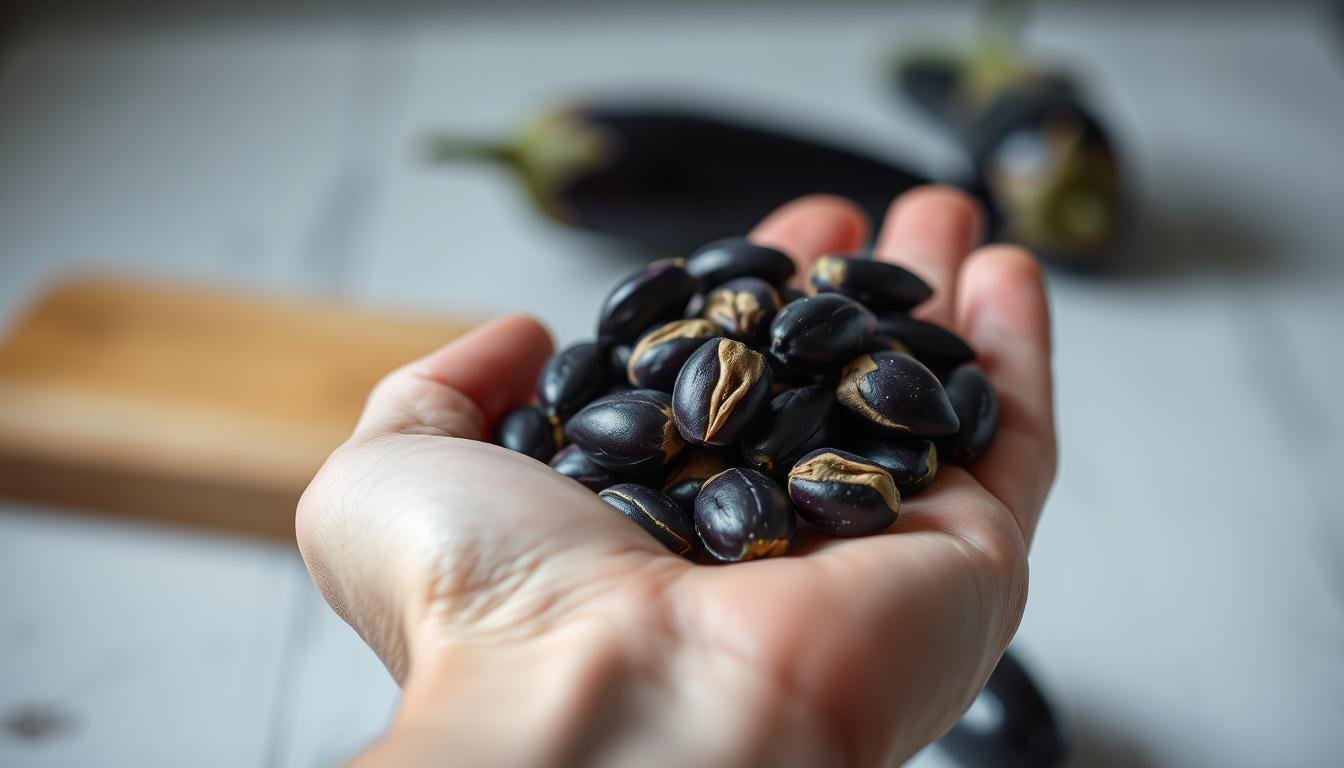Last updated on August 21st, 2025 at 02:45 pm
Can You Eat Eggplant Seeds? Have you ever wondered if it’s safe to eat eggplant seeds in your favorite dishes? It’s a natural question, especially with more people wanting to use every part of vegetables.
Eggplant is loved in many cuisines worldwide. We often use its flesh in recipes, but what about the seeds? Are they safe to eat?
This article will dive into the truth about eating eggplant seeds. We’ll look at their safety and any health benefits they might offer. By the end, you’ll know if you should add eggplant seeds to your meals.
Contents
- 1 Understanding Eggplant Seeds
- 2 Can You Eat the Seeds of Eggplant?
- 3 Nutritional Profile of Eggplant Seeds
- 4 Health Benefits of Eating Eggplant Seeds
- 5 Potential Concerns and Considerations
- 6 Conclusion: Can You Eat Eggplant Seeds?
- 7 FAQ
- 7.1 Are eggplant seeds safe to eat?
- 7.2 Do eggplant seeds have any nutritional value?
- 7.3 Can I eat the seeds of all types of eggplant?
- 7.4 Are there any potential health risks associated with consuming eggplant seeds?
- 7.5 How can I incorporate eggplant seeds into my diet?
- 7.6 Will eating eggplant seeds cause any digestive issues?
- 7.7 Can cooking eggplant seeds reduce their nutritional value?
Understanding Eggplant Seeds
Eggplant seeds are more than just leftovers from the fruit. They have their own special nutritional benefits. You might not see them at first, but they are a big part of the eggplant, offering surprising health perks.
Eggplant seeds are found inside the eggplant’s flesh. They are small and soft, hidden in the fruit’s cavities. These seeds help the eggplant plant grow and reproduce.
Eggplant seeds are packed with good stuff like healthy fats, proteins, and fiber. This makes them very nutritious.
| Nutrient | Value per 100g | % Daily Value |
|---|---|---|
| Protein | 1.2g | 2% |
| Fat | 0.2g | 0% |
| Fiber | 2.5g | 10% |
Knowing what eggplant seeds are made of can help you decide if you should eat them. They are not only safe to eat but also add to the eggplant’s nutritional value.
Can You Eat the Seeds of Eggplant?
Many people wonder if eggplant seeds are safe to eat. It’s a common question among home cooks and food lovers. We need to talk about the safety of eating eggplant seeds.
Eggplant seeds are indeed safe to eat. They are found inside the eggplant and are part of its flesh. So, when you eat eggplant, you’re also eating the seeds.
Safety Considerations
Even though eggplant seeds are safe, there are some things to think about. Some people might get upset stomachs from certain compounds in eggplant. But this is rare and usually not because of the seeds.
Let’s look at some important safety points about eggplant seeds:
| Safety Aspect | Description | Precaution |
|---|---|---|
| Allergic Reactions | Rarely, some individuals may be allergic to eggplant or its seeds. | Be aware of any allergic symptoms, such as hives or itching. |
| Gastrointestinal Issues | Eggplant contains compounds that might cause stomach upset in sensitive individuals. | Consume eggplant in moderation to minimize potential discomfort. |
| Chemical Contaminants | Eggplant seeds, like other parts of the plant, may absorb chemicals from the environment. | Choose organic eggplants or wash them thoroughly before consumption. |
Eggplant seeds are a part of the eggplant’s natural composition. Eating them is not risky. Just be careful and take simple steps to stay safe while enjoying your meals.
In summary, eggplant seeds are safe to eat. Knowing the safety tips and taking precautions lets you enjoy eggplant without worry.
Nutritional Profile of Eggplant Seeds
Eggplant seeds are packed with antioxidants, vitamins, and minerals. Eating eggplant means you get a low-calorie veggie and a nutrient-rich seed. This seed can boost your nutrient intake.
The nutritional profile of eggplant seeds is impressive. They are full of vitamin E, a key antioxidant. Vitamin E protects cells, supports skin health, and may lower cancer and heart disease risks.
Eggplant seeds are also high in dietary fiber. Fiber is key for healthy digestion. It helps prevent constipation, reduces diverticulitis risk, and supports blood sugar levels. Fiber also makes you feel full, helping with weight management.
These seeds also have minerals like potassium, magnesium, and iron. Potassium helps control blood pressure. Magnesium is important for muscles and nerves. Iron keeps red blood cells healthy, carrying oxygen.
Adding eggplant seeds to your diet can boost your nutrient intake. Knowing their nutritional profile helps you make smart diet choices. This can lead to better health.
Health Benefits of Eating Eggplant Seeds
Eggplant seeds are not just good to eat; they’re also full of nutrients. Eating them can boost your health in many ways.
One big health benefit of eating eggplant seeds is their antioxidants. Antioxidants protect your cells from damage. This can help prevent aging and some diseases.

Eggplant seeds are also high in fiber. A diet rich in fiber is good for your digestive health. It can help prevent constipation and keep blood sugar levels healthy.
These seeds are also packed with vitamins and minerals. They have vitamin C for a strong immune system and potassium for blood pressure control.
Adding eggplant seeds to your meals can make your diet better. They can help with digestion, boost antioxidants, and add variety to your food.
Potential Concerns and Considerations
Eating eggplant seeds can have its risks and things to think about. They are usually safe, but it’s good to know a few things to stay healthy.
Allergic reactions are a big concern. Even though it’s rare, some people might be allergic to eggplant or similar plants. If you get hives, itch, or have trouble breathing after eating eggplant seeds, get help right away.
There are other safety issues too. Eggplant seeds might affect how some medicines work, like blood thinners. They could also make health problems worse. If you’re worried about your health or are on medication, talk to your doctor before eating eggplant seeds often.
Here are some important things to remember:
- Watch out for allergic reactions and how your body reacts.
- Talk to your doctor if you have health issues or take medicines.
- Eat eggplant seeds in small amounts as part of a healthy diet.
By knowing these things and being careful, you can enjoy the good stuff in eggplant seeds. This way, you can avoid any big problems.
Conclusion: Can You Eat Eggplant Seeds?
You now know that eggplant seeds are safe to eat and packed with nutrients. They offer many health benefits, like supporting heart health. They also provide essential vitamins and minerals.
Adding eggplant seeds to your diet is easy and boosts your nutrient intake. The seeds are full of antioxidants, fiber, and other good stuff. These help support your overall health and well-being.
So, can you eat the seeds of eggplant? Absolutely. By adding eggplant seeds to your meals, you get to enjoy their nutritional benefits. This summary shows how eggplant seeds can be a great addition to a healthy diet.
See Also: Can You Eat the Seeds of Soursop?
FAQ
Are eggplant seeds safe to eat?
Yes, eggplant seeds are safe to eat. They are full of nutrients like fiber, vitamins, and minerals.
Do eggplant seeds have any nutritional value?
Eggplant seeds are packed with antioxidants, fiber, and vitamins and minerals. They are a healthy choice for your diet.
Can I eat the seeds of all types of eggplant?
Yes, you can eat the seeds of most eggplant varieties. But, some may taste bitter because of solanine.
Are there any potential health risks associated with consuming eggplant seeds?
While safe for most, some may have allergic reactions or interact with medications. This is due to compounds in the seeds.
How can I incorporate eggplant seeds into my diet?
You can add eggplant seeds to salads, stir-fries, or as a topping. They can be eaten raw or cooked.
Will eating eggplant seeds cause any digestive issues?
For most, eggplant seeds are easy to digest. But, some might feel uncomfortable if they eat too much.
Can cooking eggplant seeds reduce their nutritional value?
Cooking can slightly lower the nutritional value of eggplant seeds. But, they stay nutritious when cooked gently.

Hello, I am Bellamy George, a certified nutritionist and food safety specialist from Springfield, IL. With a degree in Food Science, I share research-backed insights on edible foods, seeds, and seafood for safe, informed eating.

